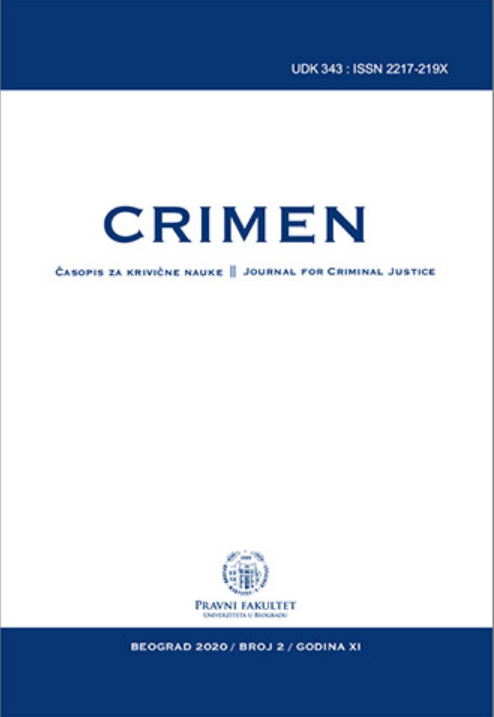POJEDINA SPORNA PITANJA U VEZI SA USLOVNOM OSUDOM
CERTAIN CONTENTIOUS ISSUES RELATED TO THE SUSPENDED SENTENCE
Author(s): Veljko Delibašić, Tijana KostićSubject(s): Law, Constitution, Jurisprudence, Criminal Law
Published by: Правни факултет Универзитета у Београду
Keywords: non-custodial measure; suspended sentence; criminal sanction; special proceedings; to pronounce/pass/deliver sanction
Summary/Abstract: This paper addresses the issue of suspended sentence since it is a criminal sanction frequently applied in Serbia and statutory provisions regulating suspended sentence are also subject to frequent modification which altogether emphasizes the need of its continuous study. Within the general purpose of criminal sanctions, the purpose of a suspended sentence is to avoid imposing the sentence on an offender for a minor offence in cases when it can be reasonably expected that a warning with a threatened sentence shall suffice to prevent the offender from perpetrating other crimes. Suspended sentence can be granted only when the offender has been sentenced to less than two years imprisonment, however, on condition (which was tightened in 2019) that the crime does not fall within the category of criminal offences for which an eight-year prison sentence (before it was 10 years) or longer can be delivered. Subjective reasons due to which suspended sentence cannot be granted have been also extended, so therefore, suspended sentence can be granted only if more than five years have elapsed from the time the judgment became final by which the offender was sentenced either to imprisonment or was pronounced a suspended sentence for a crime with premeditated intent. In view of the fact that a fine is still a form of punishment and, accordingly, a stricter criminal sanction than suspended sentence which is a non-custodial measure meaning a more lenient sanction, it would be quite acceptable if the legislator, as a limiting factor, also envisaged a fine for a crime with premediated intent. As regards a fiveyear term calculated from the finality of judgment, a better solution would be that the period be calculated from the day of the sentence being served, prescribed or the day a pardon has been granted, i.e. from the day when the adherence monitoring period to probation conditions has expired. Furthermore, recently introduced statutory solutions would result in decrease in the number of suspended sentences in criminal sanctions structure. When it comes to suspended sentence supervision order, as it is rarely applied, it is necessary that minimum effort be invested in providing material conditions and human resources for carrying out this sanction which was found to be effective in many countries. A serious omission of legislators is that the Criminal Procedure Code, when defining the institution of hearing for pronouncing a criminal sanction, leaves an option to the public prosecutor to propose passing of a suspended sentence with determining fine, which is contrary to the Criminal Code. This omission should be corrected by giving priority to the Criminal Code i.e. by excluding the option for the public prosecutor to propose such a sanction.
Journal: CRIMEN - časopis za krivične nauke
- Issue Year: XI/2020
- Issue No: 3
- Page Range: 314-324
- Page Count: 11
- Language: Serbian

